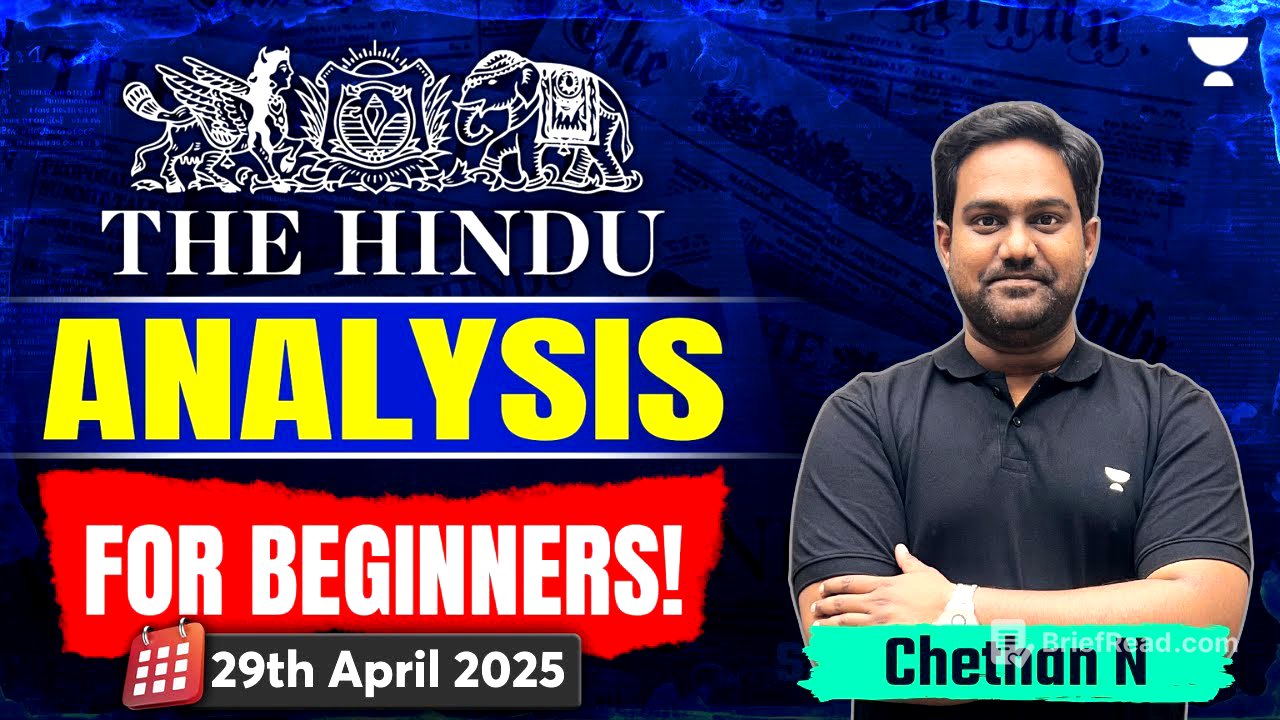TLDR;
This session provides a detailed analysis of six important articles from The Hindu newspaper, focusing on their relevance to the UPSC Civil Services Exam. The topics covered include the importance of the Deputy Speaker of the Lok Sabha, the challenges facing India's urban future, the UNSC statement on the Pahalgam attack, the concept of risk society and its disproportionate burden on women, UP's drive against encroachments on the India-Nepal border, and a tribute to Guru Tegh Bahadur.
- The Deputy Speaker's role is constitutionally significant, ensuring continuity and stability in the Lok Sabha.
- Indian cities face immense challenges due to unplanned urbanisation and are inadequately prepared for future climate-related risks.
- The UNSC's response to the Pahalgam attack was criticised for its diluted statement, omitting key details about the terrorist group and Pakistan's involvement.
- Risk society disproportionately affects vulnerable populations, particularly women, due to technological and environmental changes.
- UP's encroachment drive on the India-Nepal border raises concerns about its impact on cross-border trade and local livelihoods.
- Guru Tegh Bahadur is revered for his bravery and defence of his community against Mughal atrocities.
Introduction [0:00]
The session begins with a welcome to Unacademy IAS English, a platform for civil service aspirants. The presenter outlines the six topics selected from The Hindu for comprehensive analysis, aiming to save viewers time by providing detailed coverage. Viewers are encouraged to support the initiative through likes, comments, and subscriptions, and to join the Telegram channel for session PDFs. An announcement is made regarding discounted online classes for UPSC CSE aspirants, with a code "IAS English" for availing the offer.
Post of Deputy Speaker is not symbolic or optional [2:14]
The article discusses the importance of the office of the Deputy Speaker of the Lok Sabha, highlighting that the post has remained vacant for an extended period, including the entire duration of the 17th Lok Sabha. The writer examines the relevance of this office, the reasons for its vacancy, and the potential implications. Article 93 of the Indian Constitution mandates the election of a Speaker and Deputy Speaker, emphasising a sense of urgency. The Deputy Speaker's role is not merely ceremonial but provides continuity and stability, acting as a redundancy to ensure the Lok Sabha's functioning, especially in the Speaker's absence. The historical context traces the office back to the British era, with the first Deputy President in the central legislative assembly in 1921. The Deputy Speaker often comes from the opposition party, fostering consensus-based law-making and maintaining a balance of power. The writer expresses concern that the prolonged vacancy may be a deliberate attempt by the ruling party to push its legislative agenda, undermining parliamentary democracy. A solution could involve a constitutional or legal reform prescribing a time limit for filling the office after a new Lok Sabha is constituted.
India’s urban future is at a crossroads [17:59]
The article examines the challenges facing India's urban spaces due to rapid and unplanned urbanisation. Indian cities are struggling with issues such as pollution, traffic congestion, water and power shortages, and social divides. The writers question whether Indian cities are prepared for future challenges, particularly those related to climate change. The phenomenon of urban heat islands, caused by rising temperatures and unplanned urbanisation, poses a significant threat. The blame for these issues lies with urban local bodies, which are often politicised and lack comprehensive planning for sustainability. A report by Sustainable Futures Collective highlights the need for inclusive, safe, resilient, and sustainable cities, as outlined in the UN's Sustainable Development Goal 11. The article notes the lack of a local index to track the performance of Indian cities in achieving SDG11 targets. The writers have developed their own index using data from various government reports, ranking cities on inclusivity, safety, resilience, and sustainability. Ahmedabad ranks first in inclusivity, Bengaluru in safety, Surat in sustainability, and Chennai in climate resilience. The article calls for urban local bodies to take greater responsibility, state governments to enable them, and the central government to design better schemes for holistic urban development.
UNSC statement on Pahalgam attack [34:01]
The article discusses the UNSC's statement on the Pahalgam terror attack, noting that while the attack was criticised and sympathy was expressed for India, the statement lacked specific mentions of the terrorist group TRF, its links to Lashkar-e-Taiba, and Pakistan's involvement. The religion-based targeting of Hindu tourists was also excluded. China and Pakistan were responsible for diluting the statement. China has a history of shielding Pakistan at the UN, including blocking the designation of Pakistani-sponsored terrorists through the 1267 sanctions committee. The lesson for India is that the UN may not always be a fair platform, but it can still be utilised to corner and isolate Pakistan through diplomacy. India can also leverage the FATF platform to pressure Pakistan. India should continue to push for the adoption of the Comprehensive Convention on International Terrorism (CCIT), which targets state-sponsored terrorism. Despite the diluted statement, it is still significant that the UN condemned the attack and expressed support for India.
Risk Society: how women bear a disproportionate burden [46:58]
The article discusses the concept of "risk society," coined by Ulrich Beck, which describes a society transitioning from an industrial to a post-industrial stage, facing uncertainties and hazards due to technological and environmental changes. Mega-disasters like Chernobyl, Fukushima, and the COVID-19 pandemic are examples of man-made or anthropogenic events that disrupt the world and disproportionately affect vulnerable populations. Beck identifies three distinct epochs: pre-industrial, industrial, and risk society. In the risk society, the lack of checks and balances in the industrial society has created compounding problems, threatening the survival of mankind. The writers focus on the gendered perspective, highlighting how women are disproportionately affected by technological and environmental changes due to patriarchal structures and limited access to resources. Women's traditional roles and lack of financial independence make them more vulnerable in a risk society.
UP’s drive against encroachments on India-Nepal border [57:56]
The article examines the Uttar Pradesh state government's drive to clear illegal encroachments along the India-Nepal border following the Pahalgam terrorist attack. The UP government's action has raised concerns, as no notice or time was given for people to evacuate, potentially impacting cross-border trade between India and Nepal. The India-Nepal border is shared between Uttarakhand, Uttar Pradesh, Bihar, West Bengal, and Sikkim. The border is naturally porous due to its complex terrain and the open border system under the 1950 treaty of peace and friendship. While the open border protects civilisational and cultural ties, it can be misused by organised criminal cartels and terrorists. The UP government's measure aims to address security risks, but experts warn that it could have a detrimental impact on local livelihoods and cross-border trade if not implemented with adequate consideration for the local population.
Guru Tegh Bahadur [1:03:25]
The article pays tribute to Sri Guru Tegh Bahadur, the ninth of the ten gurus who founded Sikhism. Guru Tegh Bahadur is celebrated for his bravery in defending his community against the atrocities of Aurangzeb under Mughal rule. He was a poet, writer, and warrior who contributed immensely to spirituality and the Sikh faith. He established the city of Anandpur Sahib and negotiated peace between Rajab Bishan Singh and Raja Paranal. His execution on the orders of Aurangzeb is marked as Shahid Divas.









